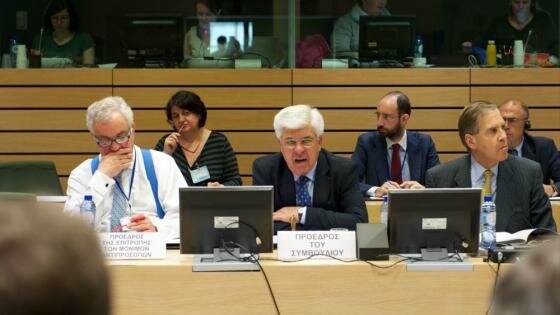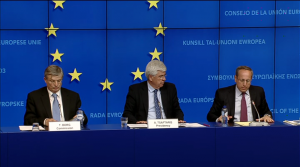- AGRIAgriculture & Fisheries (AGRI)
Plant protection measures adopted at AGRIFISH Council in Brussels (19.05.2014)
Plant protection measures were adopted during the Council of Ministers for Agriculture and Fisheries Council meeting in Brussels on 19 May chaired by Greek Minister of Rural Development and Food, Athanasios Tsaftaris.
The Agrifish Council, which convened in Brussels on 19 May under the chairmanship of Minister of Rural Development and Food, Athanasios Tsaftaris, examined the Commission’s report on the minor uses in the field of plant protection products.
Ministers also examined a number of issues, such as food loss and food waste, the protection of animals during transport, the agricultural aspects of the Climate and Energy Framework 2030, as well as state aids for rural development and measures to protect EU citrus from the risk of “citrus black spot disease” that has occurred in Africa.
Ministers of Agriculture had the opportunity to discuss, on the basis of the Commission’s report, about the creation of a European fund for plant protection products used on a smaller scale (minor uses). Although minor uses are considered by plant protection industry as economically inefficient, it is very a important issue for farmers, especially in countries like Greece, where the production is characterized by a wide range of different and specialized crops such as fruits, vegetables and floricultural plants.
The industry does not seem willing to produce such plant protection products because of high costs since demand is low. The lack of interest on the part of investors leads to a lack of authorized plant protection products, which - apart from high cost - may lead to the use of unauthorized products or to agriculture production losses. As minister Tsaftaris stated, “the issue of minor uses of plant protection products, is particularly important for the whole agriculture, since it affects a quarter of the crop of the EU, mainly in southern European countries”. Indeed, this problem affects 22% of the value of European crop production and at the same time creates an additional - over € 1 billion a year - cost to the farmers.
The debate organized by the Greek Presidency meant to seek all these measures that would ensure the availability of modern and efficient products in reasonable prices.
The Council supported the establishment of an independent technical secretariat, supported by a team of experts from all Member States. The aim of this technical secretariat will be to coordinate actions at national level and at stakeholder’s level, to create a database and to exchange information. The creation of an ERANET network on integrated pest management with special reference to minor uses was also supported.
The Council also considered measures to reduce food waste and food loss, a necessity dictated not only by social and ethical reasons, but also by economic and environmental reasons.
Ministers called for the extension of the list of products that do not require an indication of a “best before” date, an action that would reduce food waste by 20%. Ministers also examined possible actions to be taken to stimulate a better understanding and handling by consumers of “best before” dates. At the same time, they welcomed the revision of the existing legislation leading to food waste and loss.
The President of Agrifish Council, Minister Tsaftaris noted that, "agriculture must respond in a sustainable and effective way to the increasing global need for access to sufficient, safe and healthy foodstuffs. Unjustified food loss is the equivalent of a waste of resources. There is an urgent need for actions by the European Commission, to reduce wastage across the food chain, focusing on food safety and quality, for social, economical and environmental reasons."
The Council also dealt with the agricultural aspects of the Commission's proposals for the Climate and Energy 2030. The Commission's objectives focus on a 40% reduction in carbon dioxide emissions and an increase of renewable energy to cover 27% of the EU's needs by 2030.
The Presidency emphasized to the need of analyzing the agricultural aspects of the Commission's proposals, in order to ensure effective coordination of this framework with the objectives of the Common Agricultural Policy. It should also be taken into account the fact that agriculture both affects and is affected by goals on climate and energy and that ensuring adequate food production should not be compromised.
The Commission briefed the Council, at the request of the Spanish delegation on measures to be taken with regard to import controls in order to prevent the entry into the EU from South Africa of the harmful organism that causes Citrus black spot disease.
In addition, the Council took note of the request of Denmark and Sweden with regard to enforcing the protection of animals during transport and setting a maximum time limit for the transportation of live animals for slaughter.
The Agriculture Ministers also examined the Guidelines on State Aid that the Commission is working on under the funding framework for agriculture, forestry and rural development programmes 2014-2020.










